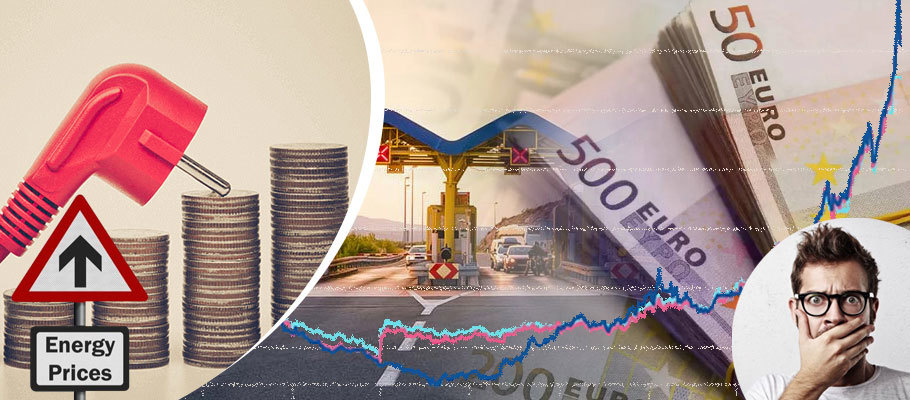
Published: March 9th, 2022
The spiking oil and gas prices seen this week have tipped the Euro into multi-year lows as forex traders bet that the European Central Bank will now sit on plans to raise interest rates this year.
Prices for Brent Crude have surged above USD 130 per barrel at time of writing, the highest level for almost 13 years. Wholesale gas prices meanwhile have more than doubled from the previous week (week commencing 28 February) as fears grew that the US and EU were considering a ban on Russian oil.
The US has since moved forward with plans to ban purchases of Russian oil and gas, and discussions are understood to still be underway with other G7 countries. European natural gas prices responded by hitting an all-time high.
In a note to investors, the FX Strategy unit at Crédit Agricole wrote that news of major Western importers considering coordinated sanctions against Russian energy exports have sent oil and other commodity prices soaring, especially in Asia.
‘Conjecture around ramped up sanctions in the energy sector has started the week with a bang. Stocks have tumbled and crude prices are soaring on Asian markets as traders' price in the impact of Biden’s Tuesday (8th March) ban announcement on Russian crude supplies’.
In response to the sudden supply shock, Crédit Agricole says there has been a ‘binary move’ in currency markets favouring the fiats of energy exporting countries. Net energy importing countries, in contrast, saw their currencies take a hit.
In its weekly currency research briefing note, Barclays said that the Ukraine conflict has delivered a negative EUR shock.
‘In the near term, the Euro has scope to trade lower given the potential stagflation effect on the Eurozone. Looking further ahead, the war could compel more structural integration by member states that provides EUR with support.’
The Pound to Euro exchange rate reached 1.2177 on Tuesday 8th March, the highest level since June 2016. The Euro to Dollar rate dipped to 1.0857, the lowest level since April 2020.
Economists say surging oil and gas prices will inevitably drag the Eurozone economy downward due to its reliance on Russian gas and deep integration with Russia's energy industry.
In an interview with Bloomberg, Stefan Galli of BMO Capital Markets European FX Strategy unit, said that a negative relationship is strengthening between the price of crude oil and EUR/USD.
‘We believe forex traders will devote significant time this week to watching how these variables play out. The risk of an all-out EU ban on Russian oil imports will be one of the most important factors hanging over EUR/USD.’
Fears of a dip in Eurozone economic growth could also push the ECB cool its jets on the planned normalisation of monetary policy. A change in course could limit Eurozone bond yields and pull the Euro down with them.
The ECB policy committee meets again on Thursday, 10th March.
'Rising prices for commodities across the board could force central banks to slam the brakes on interest rate rises. That’s impacting EUR sentiment,’ says Galli.
As the conflict rages on, Ukraine is trying to pressure the West into banning imports of Russian oil, with the country’s foreign minister telling major news outlets this week that it comes ‘steeped in Ukrainian blood.’
Antony Blinken, America’s Secretary of State, told journalists on Sunday 6th March that the US is now in ‘active discussions with European partners’ about stopping purchases of Russian oil while also sustaining a reliable global oil supply.
Now that the Biden administration has announced its Russia oil ban, forex traders are considering just how steady supplies of oil will be maintained, and what the impact on crude prices will be.
The UK has indicated that it would support a cap on how much Russian oil and gas G7 countries can purchase, though Westminster and Brussels have so far been cool to the ideal of an outright ban.
EU Commission President Ursula von der Leyen said this week that new sanctions on Russia may be coming, but an outright European ban on Russian oil probably isn't in the cards.
‘Our objective has to say focused on isolating Vladimir Putin and make it harder to finance the Ukraine war.’
On Tuesday 8th March, oil and gas prices had fallen back somewhat from their Monday highs, in part because Germany's Finance Minister announced that the country has no current plans to cease imports of Russian fossil fuel exports.
A fall back from earlier highs in energy commodities made space for the Euro exchange rate to retrace previous losses.
More support for the recovery came from headlines saying Russia would stop its military campaign 'the moment Ukraine agreed’ to a shortlist of key demands.
In a note to investors, Monex said the announcement indicated a ‘major policy retreat by Russia and signal for dip-buying if confirmed.’
Demands by Russia tabled in negotiations with Ukraine this week include acknowledging the status of Crimea (now part of Russia), recognition of the Donetsk and Lugansk breakaway republics as independent states and agreed neutrality on the issue of joining NATO.
AS the week continues, traders face a volatile and news-driven backdrop that is likely subject to extreme price swings.
For that reason, analysts think it's too soon to say if the Euro's weakening trend is ending. Traders should be ready for outsized movements in both directions.
Kremlin spokesperson Dimitry Peskov told Reuters that negotiators have discussed how to recognise Crimea is Russian territory and 'the need to accept that Lugansk and Donetsk are now independent countries.’ When those conditions are accepted, the hostilities will end, he said.
While changing its long-held stance on Crimea and the Donbass might be possible for Kyiv, ending the push for NATO membership is seen to be more problematic for Ukrainian leaders.